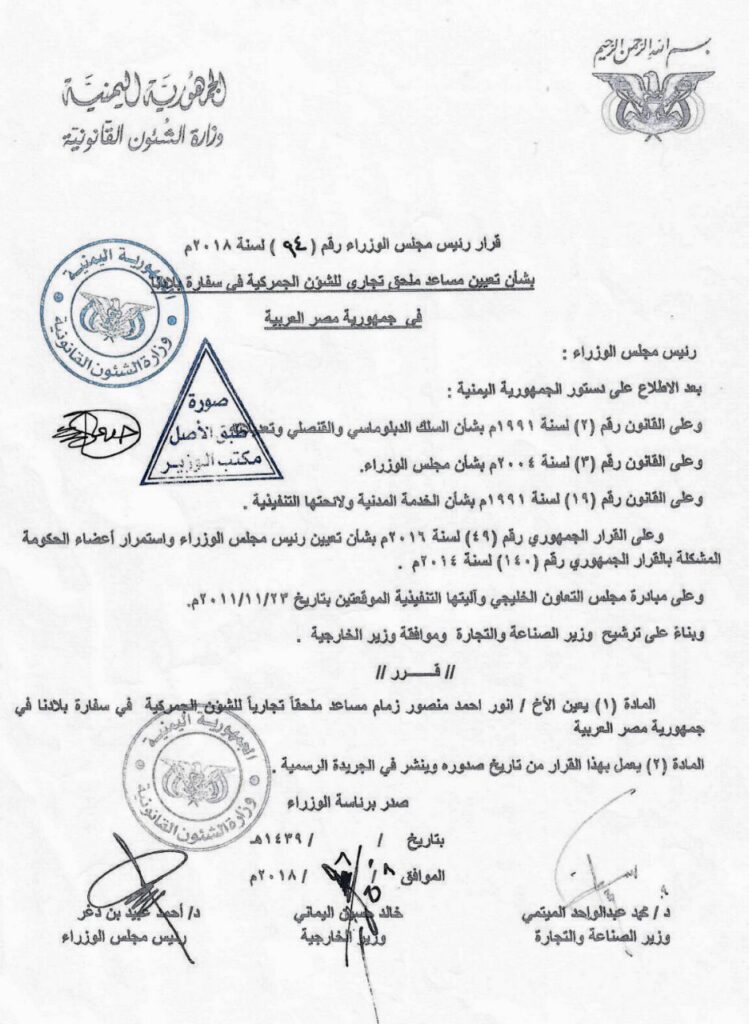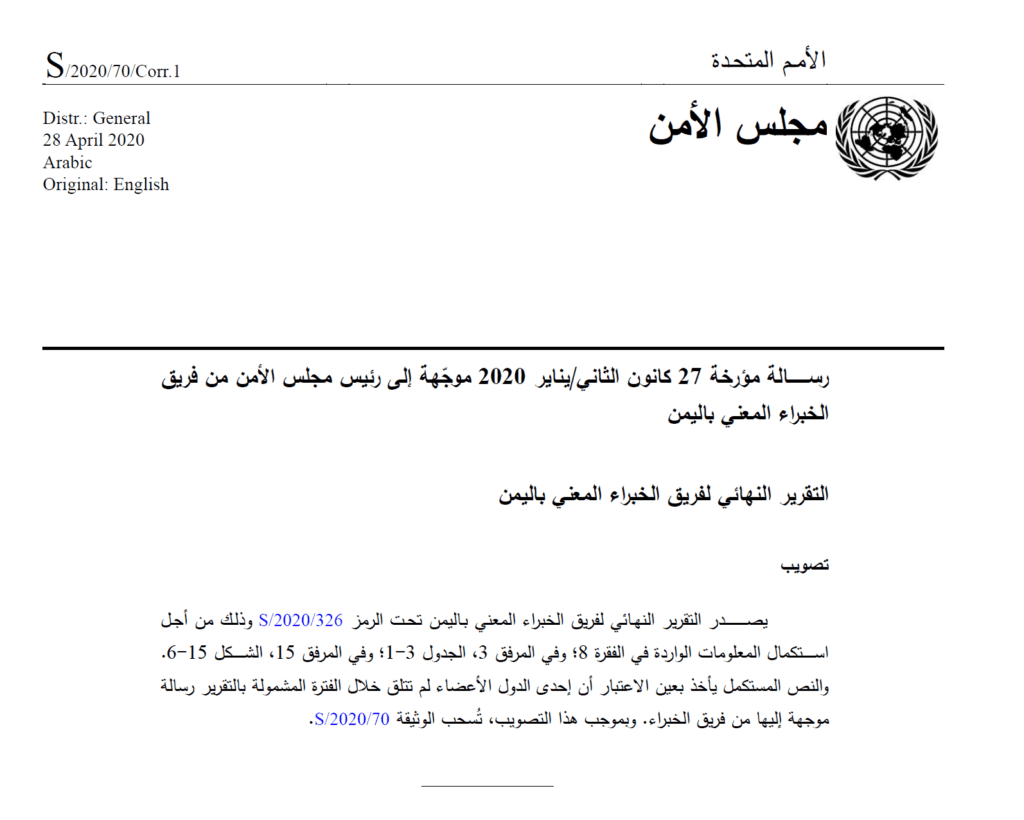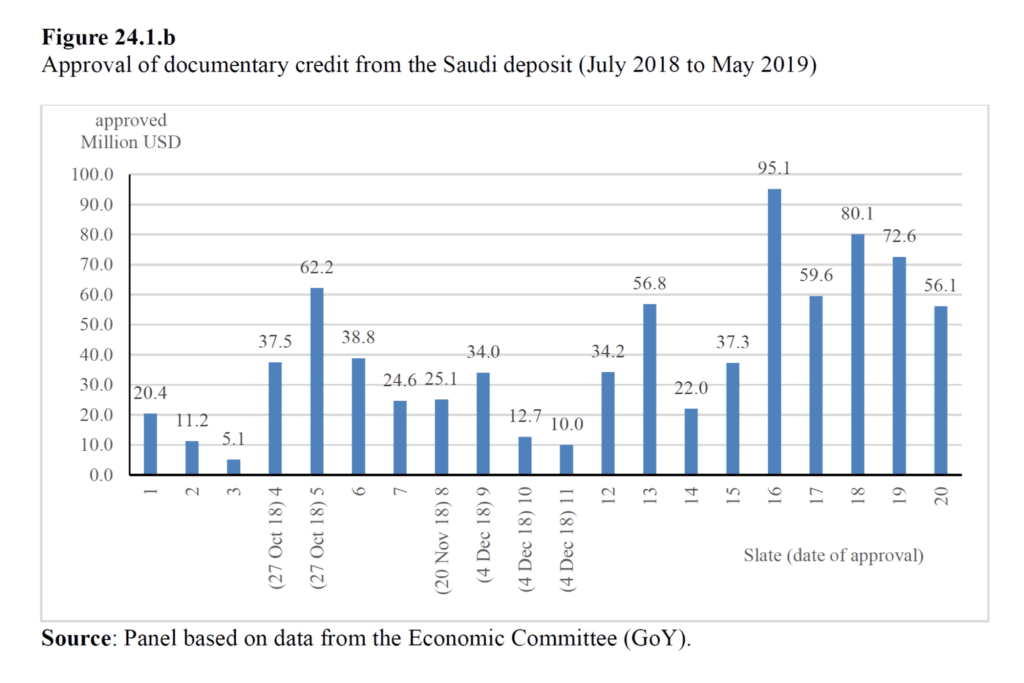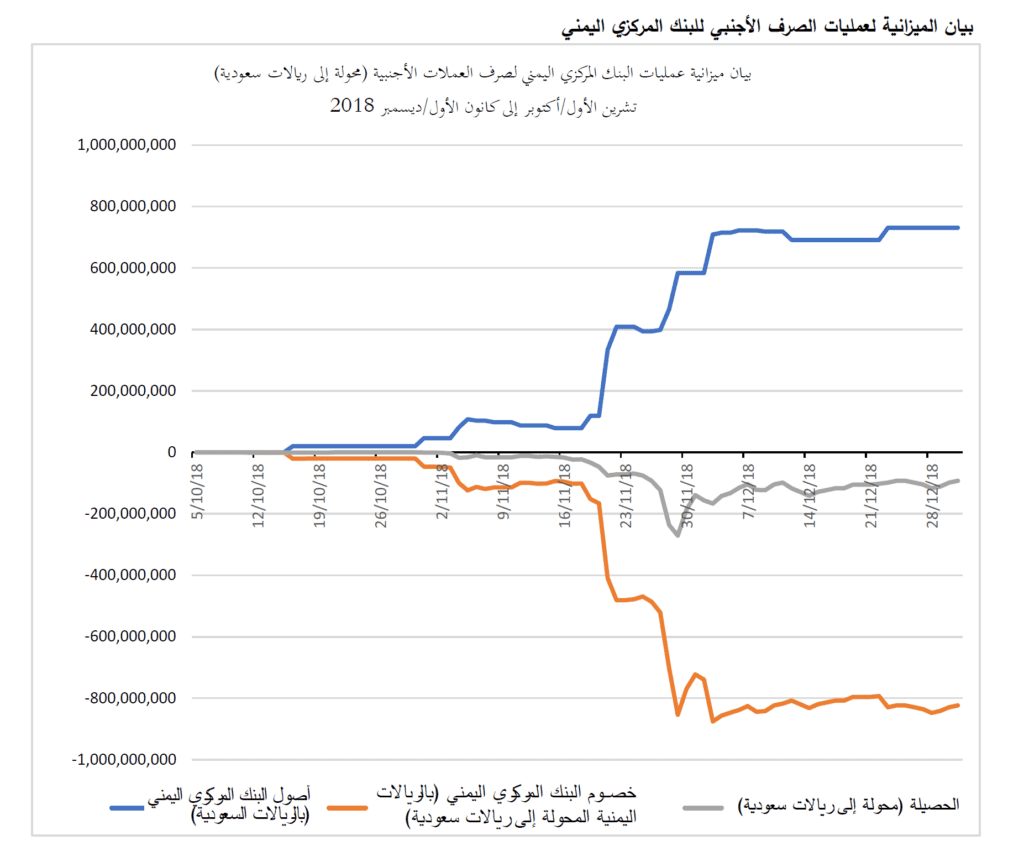Yemen continues to witness one of the world’s largest humanitarian crises. According to the United Nations‘ estimates in 2023, approximately 21.6 million people are in need of some form of humanitarian assistance, and 80% of the country is struggling to provide food and basic services.
In the midst of such a crisis, influential Yemeni officials have the ability to find alternative means to secure their comfort, while 71-78% of Yemenis live below the poverty line according to the World Bank, and 81% according to the International Organization for Migration.
Among those influential figures who have found a safe haven to escape Yemen’s reality is the former Central Bank Governor, Mohammad Mansour Ali Zammam. He obtained Dominican citizenship, which requires a minimum investment of $100,000, equivalent to 135 million Yemeni rials (based on the exchange rate in government-controlled areas) or 60 million rials (based on the exchange rate in Houthi-controlled areas).
| Yemeni Rial Exchange Rate: The Yemeni rial has two exchange rates, as the Houthi group uses the old edition of the rial, while the government of Abd Rabbo Mansour Hadi has printed a new currency. For each currency, its exchange rate against the US dollar is as follows: In Aden and government-controlled areas: One US dollar = 1,350 Yemeni rials. In Sanaa and Houthi-controlled areas: One US dollar = 600 Yemeni rials. |
This investigation is part of the “Caribbean Passports” cross-border investigative project, led by the Organized Crime and Corruption Reporting Project (OCCRP) in collaboration with the Government Accountability Project, a non-profit organization based in Washington, and various journalistic platforms in over 20 countries, including Daraj. The project reveals that around 7,700 people have purchased Dominican citizenship, enabling them to travel globally without a visa. This list includes a diverse group of politicians, suspicious or criminal businessmen, and lawbreakers.
| Benefits of Dominican Citizenship: 1. Global Mobility: Dominican citizens can travel to 144 countries without a visa, including the United Kingdom, the European Schengen Area, as well as Ireland, and they can obtain a 10-year visa to the United States. 2. Attractive Tax Policies: For investors, one of the significant advantages of Dominican citizenship is its attractive tax policies. There are no taxes on foreign income, capital gains, inheritance, stock profits, wealth, or gifts. Significant tax exemptions and other benefits come with owning a Dominican passport. 3. Ease of Processing for Family without Residence: No actual residence is required to maintain citizenship. The entire process can take less than four months, and the application can include the spouse, children under 30, parents, and grandparents of the main applicant over 65 years old. |
Mohammad Mansour Ali Zammam: Former Minister of Finance and Central Bank Governor
Mohammed Mansour Ali Zammam was appointed as the Governor of the Central Bank of Yemen in 2018. He previously held the position of Minister of Finance between 2014 and 2015 before the Houthi movement took over the government.
In the same year that Zammam became the governor of the Central Bank, in 2018, he and his family acquired Dominican citizenship, confirming this to Daraj: “I obtained Dominican citizenship months before my appointment as the governor of the Central Bank of Yemen. At that time, I was not a government official. Due to my work with various international economic institutions and as a consultant to the World Bank, I needed to travel, and the Yemeni passport was an obstacle for me. Therefore, I was looking for another nationality as I often missed out on many trips due to not obtaining a visa with my Yemeni passport.”

According to Wahid Al Foudai, an economic expert specializing in banking affairs, and based on data from the Central Bank of Yemen, the salary of a governor should range from one to two million Yemeni rials as a basic salary, which is equivalent to $1,000 to $2,000, in addition to financial incentives and other allowances. During Zammam’s tenure, according to sources in the bank, these incentives could reach up to $10,000.
When the investigation team asked Zammam about how he obtained Dominican citizenship, he replied: “I had two apartments that I sold for $130,000, which is the amount I invested in Dominica. As I told you, I work as an economic consultant in various global economic institutions, as well as a consultant at the World Bank.”
Zammam has an extensive resume, having held important positions in Yemen. His diplomatic strength allowed the Yemeni government to create a new diplomatic post to appoint his nephew, Anwar Ahmed Mansour Zammam, as the “Assistant Commercial Attaché for Customs Affairs at the Yemeni Embassy in the Arab Republic of Egypt” in 2018, according to Al Masdar Online.
Yemeni President Abd Rabbo Mansour Hadi issued a decree dismissing Zammam from the position of Minister of Finance on June 9, 2015. On February 11, 2018, he was appointed as the Central Bank Governor. During his term in this position, he was an ally of the Kingdom of Saudi Arabia, which deposited nearly two billion dollars in the Central Bank, ostensibly to strengthen the weak currency in the country.
In January 2020, the expert team of the United Nations Security Council’s Sanctions Committee on Yemen issued a report, which discusses, in pages 229 to 242, the Central Bank of Yemen and specifically names the former governor, Mohammed Mansour Ali Zammam, in a case of embezzlement.
“The Central Bank of Yemen, under the leadership of Governor Mohammed Mansour Zammam, violated all procedures and laws related to covering letters of credit from the Saudi deposit. By financing letters of credit at a much lower exchange rate than the market rate, the Central Bank suffered significant losses from these transactions, which led to weakening its budget and depleting its foreign reserves at an accelerating pace.”
The report mentions embezzlement of $423 million from the Saudi Arabian deposit of two billion dollars at the Central Bank of Yemen in Aden in January 2018. Under this program, a total of 38 installments were made by the Kingdom of Saudi Arabia for the benefit of the Central Bank of Yemen in Aden, according to the report.
Zammam responded in detail to this report through the Al Ayyam newspaper on January 31, 2021. Among other things, he stated that the report singled him out by name without including the others who led the bank, even though most of those operations occurred after he left his position in March 2019. He also rejected the accusation of “money laundering” and requested the Yemeni government and its central bank to respond on this matter.


Zammam did not deny the differences in exchange rates and deposit pricing but argued that the data in the report lacks a proper price reference. He emphasized that the Central Bank of Yemen has the legal right to determine exchange rates in coordination with the government, according to Article 23 of Law No. 14 of 2000.
The expert team quickly backtracked on this report and published a correction letter to withdraw the document. They also published a modified version regarding the Central Bank of Yemen and Zammam in particular. According to Wahid Al Foudai, “The attack on the former governor, Mohammed Zammam, was due to their reliance on reports presented by the then Chairman of the Economic Committee, Hafez Muayed, who was in disagreement with Zammam. He employed some documents out of their context, putting the expert committee in a predicament when the Central Bank administration provided clarification. The committee apologized to Zammam and deleted the report.”
However, in the final report published by the team in April 2020, the former governor did not deny the exchange rate discrepancy during his tenure. The report refers to the team obtaining “supporting banking documents confirming that the Central Bank of Yemen conducted 69 foreign exchange transactions (15 selling transactions for the Saudi riyal, 48 buying transactions for the Saudi riyal, and 6 buying transactions for the US dollar) at rates equivalent to the dollar ranging from 453 to 740 Yemeni rials between October 11 and December 28, 2018.” This period was when Zammam was the governor of the Central Bank.
The team confirmed that these transactions led to assets equivalent to approximately $185 million and liabilities estimated at about 107 billion Yemeni rials by December 31, 2018. The report noted that if these were valued using the prevailing market exchange rate, “the Central Bank of Yemen’s liabilities would amount to approximately $636 million, resulting in a loss of around $21 million.”




The report states that corruption allegations related to foreign exchange transactions led to the replacement of the Governor of the Central Bank of Yemen on March 20, 2019. However, Wahid Al Foudai stated that the Central Bank had started purchasing foreign currency from the market at the beginning of 2018. This decision was made by the Central Bank’s governor, Mohammad Zammam, the head of the Economic Committee, Hafez Muayed, and the Prime Minister, Moeen Abdelmalik, to control the economic collapse and exchange rates at the time.
“Personal disputes arose between the head of the Economic Committee and the Central Bank governor, affecting the bank’s operations. Muayed delayed the approval of daily reports, leading to financial discrepancies. Zammam was accused of embezzling these discrepancies. Reports filed by the government led to Zammam’s removal, and Muayad was appointed as the Central Bank governor. However, Muayed’s tenure lasted only six months when the government and the presidency discovered the deception he was involved in,” said Al Foudai. The team tried to contact Muayed, but he hadn’t responded back by the time this investigation was published.
Mustafa Nasr, Director of the Economic Media Center, explained the reason for the dismissal of Hafez Muayedd a few months after taking office as the Governor of the Central Bank to Daraj: “Muayed’s actions were so serious that they almost destroyed the Yemeni economy. This was done by placing a national institution like the Central Bank of Yemen on the sanctions list when the Sanctions Committee of the United Nations Security Council intervened in the bank’s operations, which is in violation of Yemeni law.”
According to an exclusive document obtained by Daraj, issued by the Yemeni Central Organization for Control and Accountability in late March 2019, it was mentioned that the former Governor of the Central Bank of Yemen, Mohammed Zamam, carried out financial transactions, currency trading, and the use of the Saudi deposit (worth one billion dollars) provided by the Kingdom in the first quarter of 2018. The document points to the abuse of the bank’s management authority in wasting large sums of money, reaching approximately 9.8 billion Yemeni rials, equivalent to about 21 million dollars.
A report from a parliamentary committee that investigated corruption allegations against Zammam, was issued on March 20, 2021 regarding exchange rate manipulation and the granting of specific banks and companies with privileges to withdraw foreign currency from the Saudi deposit. The report highlights the bank’s use of exchange rates significantly lower than market rates, resulting in the waste of 23% of the total amount used from the deposit reserve between October 13, 2018, and February 13, 2019. The report mentions that “Zammam’s dismissal and replacement were a result of disagreements between Zammam and Muayed.
In an interview with Daraj, Zammam stated that the issue of discrepancies was “a matter of political maneuvering, involving the parliament, which we didn’t want to intervene in. We didn’t wish for the parliament to interfere in such a story and announce its report, relying on the statements of the former Central Bank governor, Hafez Muayed, without any solid evidence. The price discrepancies were based on the local market fluctuations and currency rates.” He added,”If anyone can prove that I received any amount, I am ready to prove the opposite, and I am confident in myself. If there is any evidence of corruption, I am ready to appear before the judiciary at any time if a request for my presence at the prosecutor’s office is made. I am not a fugitive, and everyone knows that I am in Egypt.”
| Here is the list of positions held by Mohammad Mansur Ali Zamam: 1. 1984 – 1990: Deputy General Director of the Minister’s Office and Technical Director for the Minister – Ministry of Agriculture. 2. 1990 – 1994: General Director of the Minister’s Office and Ministry of Agriculture and Water Resources. 3. 1996 – 1998: Project Director for Education and Environment – United States Department of Agriculture, New Mexico. 4. 1998 – 1999: General Director for the People’s Participation in Natural Resources Project – Ministry of Agriculture. 5. 1999 – 2002: Head of the National Team for the Poverty Reduction Project – United Nations. 6. 2002 – 2007: Executive Director of the Business Cities Development Program (Aden, Hodeidah, and Al-Mukalla). 7. 2007 – 2010: Deputy Minister of Local Administration for the Development Sector. 8. 2010 – 2014: Head of the Customs Authority. 9. 2014 – 2015: Minister of Finance in the government of Khaled Bahah. 10. 2018 – 2019: Governor of the Central Bank of Yemen (CBY). |
Mohammad Zammam’s involvement as the primary engineer in the sale and transfer of Yemeni ports to Dubai Ports World in 2005 was accompanied by allegations of corruption and receiving bribes to complete the deal, according to the Central Organization for Control and Auditing, especially after the company neglected the port, causing it to lose its strategic importance as the number of registered containers dropped from 492,000 containers in 2008 to 146 in 2011. Regarding this, Zammam responded to Daraj by stating, “The agreement with Dubai Ports World was not solely my responsibility; we were a team of five people. I received a mere sum of $30,000.”
The “Caribbean Passports: Dominica” project raises questions about the process of granting Caribbean citizenship. Do the Dominican authorities conduct thorough background checks on applicants before opening their doors and those of 144 other countries to them?
Dominica responded to the team behind the project, confirming that “our background checks are independent and comprehensive, using internationally recognized independent due diligence companies, which can be found on our website. We also make requests to the Joint Regional Communications Center for the Caribbean Community (IMPACS JRCC). These companies/agencies verify the identity of the applicant and conduct checks through all international partners for financial crimes and security concerns, among other red flags. They use INTERPOL, the Federal Bureau of Investigation, sanctions lists, and documents. They conduct on-the-ground background checks in all areas the applicant would study, work, or reside in.”





